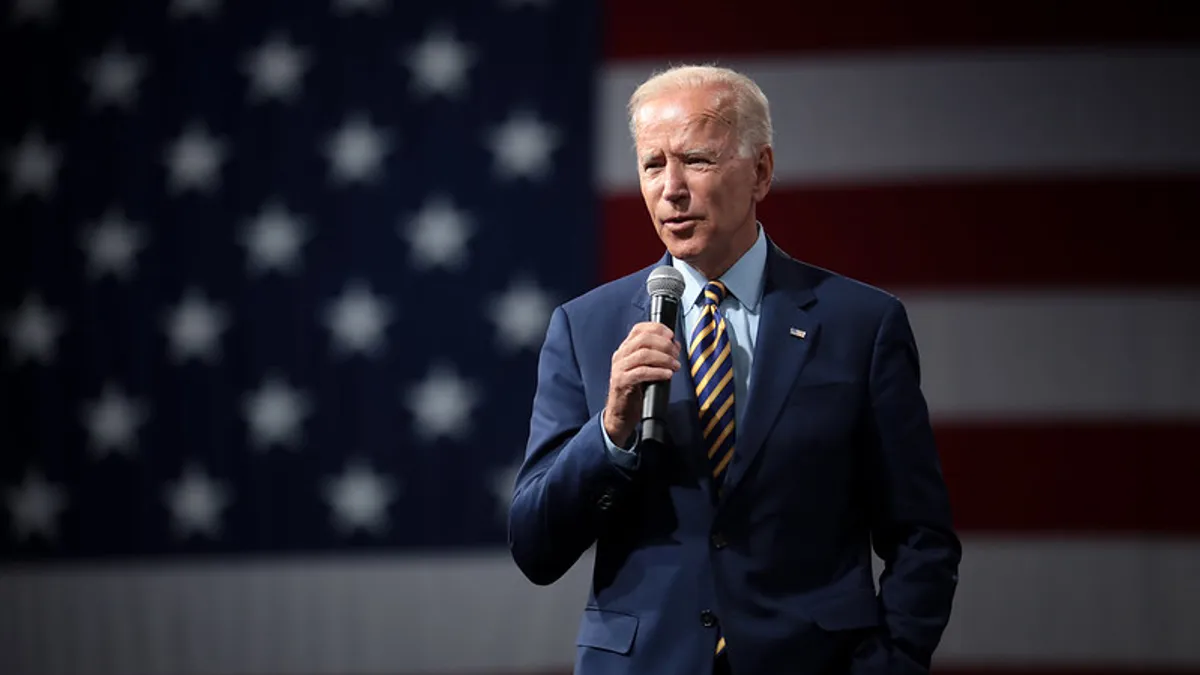Dive Brief:
- President-elect Joe Biden's plan to upgrade the buildings sector and make it more energy efficient could be critical to help fight the effects of climate change, elected officials said Wednesday during a webinar hosted by the U.S. Green Building Council.
- Biden's Clean Energy Plan says it would create 1 million jobs to upgrade 4 million buildings across the United States and weatherize 2 million homes, all within four years. Such energy efficient upgrades is something that should receive bipartisan support as it saves money in the long run and creates jobs, while also bringing down emissions, Rep. Peter Welch, D-VT, said during the webinar.
- A strong federal partner will also be needed in a national building strategy, with cities and states having led the way previously, speakers said. The federal government can play a leading role in strengthening building codes, streamlining the permitting process and pushing through approvals, with financial incentives and technical support as two key ways for national leaders to help, Rep. Kathy Castor, D-FL, said.
Dive Insight:
The incoming Biden administration has been praised by some experts for its potential benefits for the nation's crumbling infrastructure and the smart city technology market, which includes areas like artificial intelligence (AI), smart grids and other solutions.
But experts say the fight against climate change might be the most noticeable way in which the Biden administration can have an impact, not just through rejoining the Paris climate accord but also by investing in areas like buildings and providing national leadership. The onus has been on cities, states and businesses to mitigate the impacts of climate change over the past four years, and Castor said it’s time for those other bodies to be joined by national leaders in the fight.
"They have been the ones leading on green building policies, and it's time that the federal government step up to be the partner that they truly need," Castor said during the webinar. She said greener building policy could be the "unheralded hero" in the fight against climate change, especially as buildings are responsible for around 40% of greenhouse gas emissions.
Biden’s plan would make a variety of upgrades to areas like lighting systems, HVAC systems and other appliances to improve their cost and energy efficiency. For homes, the plan would include direct cash rebates and financing to upgrade household appliances and install more energy efficient windows. The administration also plans to push legislation that would set new net-zero standards for all new commercial buildings for 2030.
New momentum from the Biden administration also follows local laws like New York City's Climate Mobilization Act that has stringent local rules for buildings, while there has been a spate of cities in California and beyond that have banned the use of natural gas in new buildings.
Welch said energy efficiency improvements, a trend that has gathered momentum recently in the private and public sectors, can create jobs and help kickstart local economies that have been decimated by the coronavirus (COVID-19) pandemic. It could also have a particular impact on rural economies that are struggling in the face of shrinking populations and a digital divide that has left many residents unable to connect to high-speed internet, , Welch said.
"There is such localization of job creation when you're talking about retrofitting buildings that this has the potential to be one of the biggest jobs programs that we've ever had," Welch said. "It's intensely local, and it requires really smart people to have really good skills in plumbing, in wiring, electricians: Incredibly important occupations we can rebuild."















